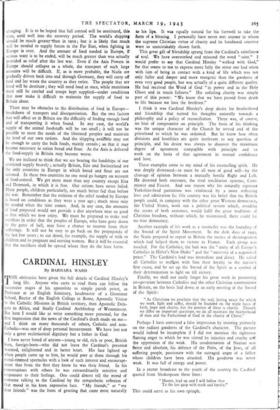CARDINAL HINSLEY
By BARBARA WARD
THE obituaries have given the full details of Cardinal Hinsley's long life. Anyone who cares to read them can follow the
successive stages of his apostolate as simple parish priest, as Professor at an English Seminary, headmaster of a Grammar School, Rector of the English College at Rome, Apostolic Visitor to the Catholic Missions in British territory, then Apostolic Dele- gate to Africa, and finally Cardinal Archbishop of Westminster. But here I would like to write something more personal, for the first impression that the news of the Cardinal's death made on me— and I think on many thousands of others, Catholic and non- Catholic—was one of deep personal bereavement. We have lost not only a great ecclesiastical dignitary but a father in God.
I have never heard of anyone—young or old, rich or poor, British born, foreign-born—who did not leave the Cardinal's presence warmed, enlightened and in better heart. His face lighted up when people came up to him, he would peer at them through his rnetal-rimmed spectacles with a look of such interest and encourage- ment that from the first they knew he was their friend. In his conversations with others he was extraordinarily sensitive and responsive to their feelings. One could almost tell the mood of someone talking to the Cardinal by the sympathetic reflexion of that mood in his keen expressive face. "My friends," or "my dear friends" was the form of greeting that came most naturally
to his lips. It was equally natural for his farewell to take the
form of a blessing. I personally have never met anyone in whom the supreme Christian virtue of charity and its handmaid courtesy were so unmistakably shown forth.
This great gift of friendship sprang from the Cardinal's saintliness of soul. We have overworked and misused the word " saint." I would prefer to say that Cardinal Hinsley " walked with God," for that seems to me to express more fully the sense one had when with him of being in contact with a kind of life which was not only fuller and deeper and more energetic than the goodness of even very good people, but was actually of a quite different quality.
He had received the Word of God " in power and in the Holy Ghost and in much fullness." His unfailing charity was simply part of this power: "We know that we have passed from death to life because we love the brethren."
I think it was Cardinal Hinsley's deep desire for brotherhood and friendship that turned his thoughts naturally towards a philosophy and a policy of reconciliation. There was, of course, no hint of compromise on principle. The basis of his thinking was the unique character of the Church he served and of the priesthood to which he was ordained. But he knew how often divisions and hostilities are quite irrelevant to any question of principle, and his desire was always to discover the maximum degree of agreement compatible with principle and to work on the basis of that agreement in mutual confidence and love.
Three examples come to my mind of his reconciling spirit. He was deeply distressed—as must be all men of good will—by the cleavage of opinion between a mutually hostile Right and Left.
He detested both extremes, the rival totr.litarian systems, Corn- =mist and Fascist. And one reason why his naturally vigorous Yorkshire-bred patriotism was :einforccd by a more reflecting love and admiration fo: this country was his belief that the British people could, in company with the other great Western democracy, the United States, work out a political system which, avoiding the errors of both extremes, would fulfil the great traditions of Christian freedom, without- which, he maintained, there could be no true democracy.
Another 'example of his work as a reconciler was the founding of
the Sword of the Spirit Movement. In the dark days of 194o, the Nazis prepared to repeat in Britain the tactics of disintegration which had helped them to victory in France. Each group was
assailed. For the Catholics, the bait was the " unity of all Europe's Catholics in Hitler's New Order " and the " necessity of a negotiated peace." The Cardinal's lead was immediate and direct.. He called all Catholics to reaffirm with him their loyalty to the nation's first cause, and he set up the Sword of the Spirit as a symbol of their determination to fight on till victory.
Finally, we shall not easily forget his great work in promoting co-operation between Catholics and the other Christian communions in Britain, on the basis laid down at an early meeting of the Sword of the Spirit:
" As Christians we proclaim that the real, lasting peace for which we work, fight and suffer, should be founded on the triple basis of faith, hope and charity, but the greatest of these is .charity. Though we differ on important questions. we do all maintain the brotherhood of man and the Fatherhood of God in the charity of Christ."
Perhaps I have conveyed a false impression by insisting primarily on the radiant goodness of the Cardinal's character. The picture
would indeed be incomplete if I did not mention the righteous flaming anger to which he was stirred by injustice and cruelty and the oppression of the weak. His condemnation of Nazism was fierce and absolute, his defence of the Poles, of the Jews, of all suffering people, passionate with the outraged anger of a father whose children have been attacked. His goodness was never weak. It was full of energy and power.
In a recent broadcast to the youth of the country the Cardinal quoted from Shakespeare these lines:
"Master, lead on and I will follow thee
To the last gasp with truth and loyalty."
This could serve as his own epitaph.


























 Previous page
Previous page